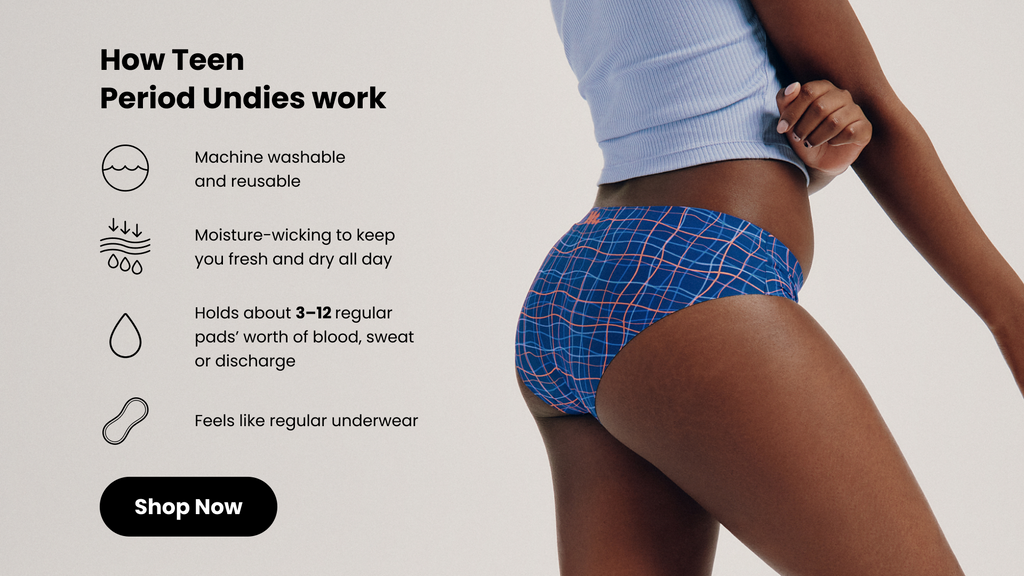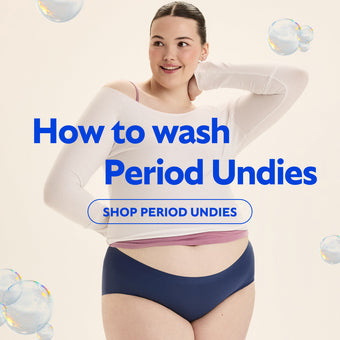Has your teen been wanting to try menstrual cups, but too nervous because they don’t know how to? Using a menstrual cup can be intimidating, but we're here to help! By the end of this post, we hope you can help them feel confident to wear a menstrual cup as part of their period care lineup.
How to Insert a Menstrual Cup
Remember, your teen might not get how to insert the cup the first time, and that’s okay. It can take a few practice rounds learning how to fold the menstrual cup, and some getting used to when it comes time to remove the cup.
We suggest having them follow the instructions on how to insert a menstrual cup at home in a relaxed setting. They can grab a mug of their favorite tea, zen out and head to the bathroom...maybe grab a mirror if they need to. It’s not a race, they should take their time and get to know how the menstrual cup works with their body. Many people like to find a comfortable position sitting on the toilet or standing with one leg propped up on the side of the toilet or the bathtub, similar to how to put in a tampon.
Step-by-step instructions for your teen on how to insert a menstrual cup:
-
When using a menstrual cup, it's important to have clean hands to insert and remove it. Wash your hands and the cup with clean water and a mild soap before starting.
-
Fold the cup. Everyone’s anatomy is unique, so try folding it a few different ways, as one way may be easier to insert for you than another.
The c fold, or punch down fold, is a popular method (see image above): Use one hand to hold the cup and use your opposite index finger to push the rim of the cup inward. Using the hand you're holding the cup with, push the sides together and hold firmly, sort of folding the cup in half vertically. This should form something that looks like a 'c' shape. (If the c fold doesn't work for you, try the 7 fold, or one of the other fold techniques outlined in this video.)
-
RELAX, find a comfortable position, and insert the folded cup into your vagina, just like you would with a tampon.
-
Push it in at a 45 degree angle.
-
The cup should sit as low as it comfortably can in your vagina, usually just a little lower than a tampon, with the stem fully inside.
-
When the cup is inside, it will ‘POP’ open and create a light, comfortable suction. This is what prevents any leaks.
-
-
Twist and rotate the cup to make sure it is suctioned and won’t leak.
One of the benefits of using a cup is your teen can leave it in for up to 12 hours. This is obviously dependent on how heavy their period is, so they can test it out at home first to see what works for them.
If they are nervous about leaking, they can try a menstrual cup and a pair of period-proof underwear or reusable pads. They're a perfect pairing.
Further reading: How to insert a tampon
Instruction Your Teen: How to Remove A Menstrual Cup
-
Wash your hands.
-
Gently pull the stem of the cup downwards, until you can grip the actual cup.
-
Wiggle it back and forth and pull it down. Pinch the base of the cup, so it breaks the suction seal.
-
When you’re pulling it out of your vagina, make sure to keep it upright, so there is no spillage, especially if you have a heavy flow.
-
Pour out the contents into the sink or toilet.
-
Rinse the cup with warm water.
How to Clean A Menstrual Cup
When on their period, they can just rinse it thoroughly with warm water after each use. But at the end of their period, they will need to disinfect it. All they have to do is rinse it, and boil it for 3-5 minutes. There are many cup cleaners, you can also purchase for them too!
Menstrual Cup FAQ
What size should I get for them?
Each company has a different size guide, but if your teen is new to the period world, then choose the smaller size.
Can they use a cup with an IUD?
Yes! Talk to their doctor first though to make sure the strings of the IUD are cut short. If they are ever questioning anything, always ask a doctor as they will give the best advice!
How are they different from tampons?
Menstrual cups actually collect the flow, where tampons absorb the blood. A major plus about cups is your teen doesn't have to worry about Toxic Shock Syndrome. If you want to learn more about that, read out blog here.
Can a cup get lost inside of them?
No, when a menstrual cup is inserted there is no where for the cup to go beyond the vaginal canal. If it seems really far up the vaginal canal, they can use their muscles to work the cup low enough to grab it with their fingers. If they're ever worried or concerned, they can talk to a trusted friend or caregiver, and when in doubt, contact a doctor.
Will it get stuck?
No, the cup has nowhere to go but out. If your teen is trying to remove it, but it seems stuck, encourage them to stay calm and make sure their muscles are relaxed. It’s only because it’s suctioned really well, so they should try to find the base of the cup and pinch it to loosen the suction.
What are they made of?
Menstrual cups are made of silicone. They need to be flexible to move with the body and are made with high quality healthcare grade silicone.
How much do they hold?
Most hold an ounce of blood, which doesn’t seem like a lot, but that’s more than double what a tampon will hold.
Can they feel the menstrual cup inside of them?
As long as they have the right size and have inserted it correctly, they shouldn’t feel it at all. At the beginning, they will most likely have to try it out a few times. I know I sure did! Revisit our guide on how to insert a menstrual cup above if they need a refresher.
Can you swim and workout with a menstrual cup in?
Yes, of course! Who knows, they may even find it more comfortable than a tampon or pad. Plus, they can wear it with Kt Period-Proof Swimwear or Kt Leakproof Activewear and they'll be sure to avoid any accidental leaks at the pool!
Remember, there is no right or wrong to what they use as period protection. Menstrual cups are definitely better for the environment than disposables, but do what is comfortable for THEM.
Disclaimer: The blog writers at Kt by Knix are not medical professionals, and give this advice based on their own research and experience. If you have further questions or concerns, speak to a trusted medical professional.







